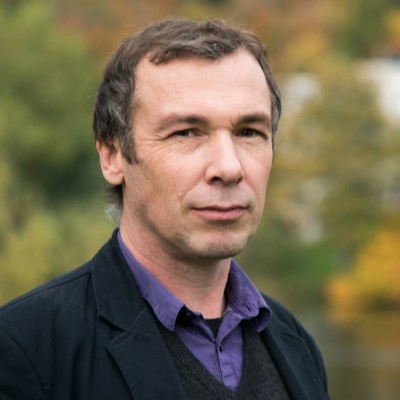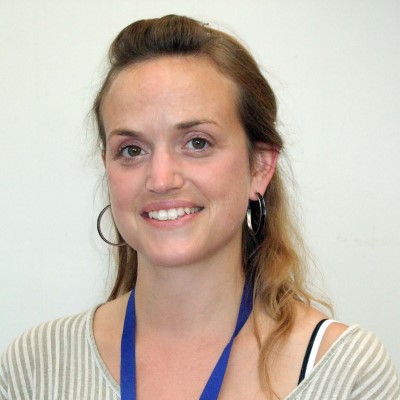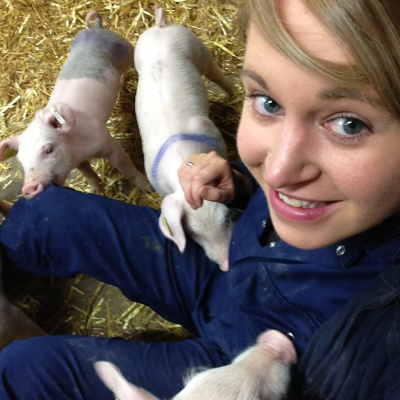CIEL | Meet the Scientist
Dr Katerina Theodoridou
Senior Lecturer in Farm Animal Nutrition

What project/s are you currently working on?
I am principal investigator or co-investigator on several underpinning and applied research projects and Ph.D. programmes on uncovering and developing nutritional strategies to improve nutrient use efficiency and animal performance, while simultaneously reducing the greenhouse gas emissions from ruminants.
Current projects include:
- Evaluating the nutritive value of willow tree fodder and assessing its potential to reduce methane/ammonia emissions and improve Nitrogen use efficiency from ruminants;
- Investigating the potential of different seaweed species to improve animal performance (working on beef and dairy), mitigate methane emissions and improve the quality of animal products, and reveal how rumen microbes influence metabolic pathways and product quality;
- Evaluating the nutritive value of different Agro-industrial by-products, the optimum inclusion levels in the diet of the animals, and potential conservation methods;
- Quantifying the impacts of different sward types in terms of grazing production, nitrogen and energy utilisation efficiencies, methane emissions, and rumen microbial activity in dairy and beef cows;
- Researching different feeding strategies and novel slurry treatments to reduce ammonia levels in cattle slurry;
- The use of insects for sustainable animal feed, predicting the chemical composition and digestibility of insects using infrared spectroscopy techniques (FT-IR) and comparing the pre-biotic potential of different insect-derived products vs soya in a simulated in vitro fermentation system;
- Exploring the nutrient molecular structure of feeds in relation to their digestibility, ruminal fermentation, and nutritive value, evaluating different feed sources on their potential to be used as animal feed.
What capability are you drawing on to deliver the research?
The laboratories at Queen’s University Belfast are located in the newly built School of Biological Sciences, which houses the flagship Institute for Global Food Security (IGFS). The School of Biological Sciences brings a critical mass of scientists together to tackle the global challenges around food security. The new home for the School allows the co-location of capacity and capability in microbiology, food science, ‘omics, animal science and agriculture.
The world-class facilities include:
- GC, HPLC and UPLC separation platforms;
- ICP, IR, qToF and QqQ mass spectrometers;
- Microbiological and Molecular research facilities;
- Antibody production and biomolecule binder development;
- Cell culture suite and bioanalytical assay detection systems;
- NMR, NIR and Raman spectrometers;
- Proteomic and metabolomic profiling tools RT-PCR;
- Transcriptomic profiling;
- Next-generation sequencing;
- Multiplex biosensor platforms and LFD development.
Facilities for Feed Evaluation
We have different established in vitro facilities to evaluate the feed digestibility, nutrient degradation, and methane/ammonia emissions (ANKOM RF Gas Production System, batch culture system, RUSITEC).
A strategic alliance with the Agri-Food and Biosciences Institute extends access to even more research capability such as the CIEL-supported Precision Grassland Platform which allows us to study the grazing environment in detail, testing new innovations in grassland management and tracking the interactions from the soil, through the plant to the animal, and the resultant meat and milk produced. AFBI Hillsborough has auto-feeding and recording systems for dairy and beef cattle and sheep, which can record daily feed intake, water intake, and intake behaviors and also auto-deliver concentrate supplements with a prescheduled feeding program. A range of sward types is available and access to a 300-cow research dairy herd. GreenFeed Pasture Systems from C-Lock Inc. Units are available to measure enteric methane emissions of grazing cows.
What would be your ideal research project, assuming no barriers!
What a fantastic question! I would design a large programme to explore novel feeds and complete a screen for their nutritive value and molecular structure. Then I would really love to complete a large-scale, in-depth, dairy and beef trial with the most potent feeds and I would extend this work to include evaluation of animal products and long human intervention studies.
How did you arrive at doing what you do now?
I was born in Thessaloniki, Greece and I completed my BSc studies in Animal Production at the University of Thessaly. Then I decided to move to the Netherlands where I conducted an MSc in Ruminant Nutrition, on the ‘Evaluation of protein quality in processed peas by chemical characterization methods’, at Wageningen University, Netherlands (2004-2006). After graduation, I worked as an animal nutritionist in an international feed company in the Netherlands, while looking for a Ph.D. opportunity as I love to research. I got then the opportunity to undertake a PhD position in France, at INRA- Clermont Ferrand, on the “The effects of condensed tannins in sainfoin (Onobrychis viciifolia) on its digestion and nutritive value (2006-2009). Then I joined the Animal Science department at the University of Saskatchewan, in Canada (2011- 2014) to work in a very exciting field. I investigated the feed nutrient molecular structure, ruminal fermentation, digestion, and feed value using different spectroscopy techniques (FTIR, NIR, SRFTIRM) and the synchrotron. Then I had my first academic post as a Lecturer in Farm Animal Nutrition (Queen’s University of Belfast, 2014-2020) and now I am a Senior Lecturer since 2020.
Can you provide some information on some of the work your institution is involved in?
The School of Biological Sciences and the Institute of Global Food Security have research programmes in subjects ranging from basic biochemistry, molecular genetics, and cancer research to agricultural science, marine ecology, and the economic evaluation of ecosystem services and food retailing.
There are three broad themes to research:
- Agri-Food Systems and Human Nutrition – This theme focusses on how agrifood systems can be better positioned to provide safe, authentic and healthy diets with high-quality plant, livestock and aquaculture products, whilst supporting human and animal health in a way that is sustainable and resilient to climatic changes.
- Understanding Health and Disease – covering humans, plants, and animals with research strengths in prevention, diagnostics, surveillance, epidemiology, and treatments. We study how health can be improved through food and nutrition and how diseases can be tackled by understanding their fundamental molecular mechanisms, including those underpinning the biology of pathogens and parasites. Our researchers work in human cancer and genetic diseases, in infections caused by bacteria, fungi, viruses, and parasites, and in how global health and disease will be affected by global warming and climate change.
- Sustaining Ecosystems and Biodiversity – covers research in biodiversity and ecosystem services for environments ranging from tropical forests to deep oceans, using field techniques and skills such as wildlife tracking, taxonomy, geostatistics, molecular and genetic ecology, environmental microbiology, microbial ecology, food web analysis, microcosm and mesocosm experiments, and mathematical/computational methods. Within this theme we also study the behaviour and temperament of wild, agricultural or domestic animals and their implications for welfare and ability to respond to environmental change.
To find out more about any of the research themes highlighted, please contact CIEL and we will put you in touch with Dr Katerina Theodoridou.






